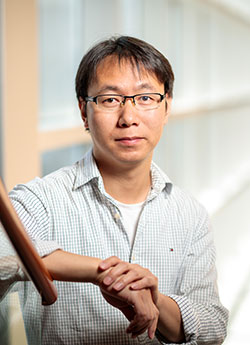Postdoc researcher Zhang receives STAT honor
Recognized for work on mosquito-borne viruses Zika, chikungunya
 Matt Miller
Matt MillerZhang
Rong Zhang, PhD, a postdoctoral researcher at Washington University School of Medicine in St. Louis who studies how viruses cause disease, has been named a 2018 Wunderkind by the national biomedical publication STAT News. The award honors young scientists and doctors who are blazing new trails in research and public health at the start of what promises to be impressive careers.
Zhang, who works in the laboratory of Michael S. Diamond, MD, PhD, the Herbert S. Gasser Professor of Medicine, and colleagues used CRISPR technology to identify a set of genes that is vital for Zika and related viruses to spread infection between cells. Further, he showed that shutting down a single gene in this pathway — in both human and insect cells — does not negatively affect the cells themselves and renders such viruses unable to leave the infected cell, curbing the spread of infection. The study points to a potential drug target for Zika and related viruses such as dengue and West Nile that have major impacts on public health.
He also identified why chikungunya and related viruses target the joints. Chikungunya and its relatives can cause a debilitating form of arthritis that persists for months or even years. Zhang and colleagues identified the molecular handle that chikungunya grabs to get inside cells. The handle, or receptor, is located on cells that build cartilage, muscle and bone. Joints are filled with such cells, which helps explain patients’ painful symptoms. Further, by creating decoy handles, the researchers showed that they could reduce chikungunya infection and signs of arthritis.
“Rong is a superb, thoughtful, organized and meticulous scientist,” Diamond said. “He has generated an important and impressive body of work that has changed the way we think about how viruses interact with host proteins to facilitate infection.”
After more than four years at the School of Medicine, Zhang is applying for faculty positions in his native China, where he intends to continue studying viral infections with significant impact on public health.






